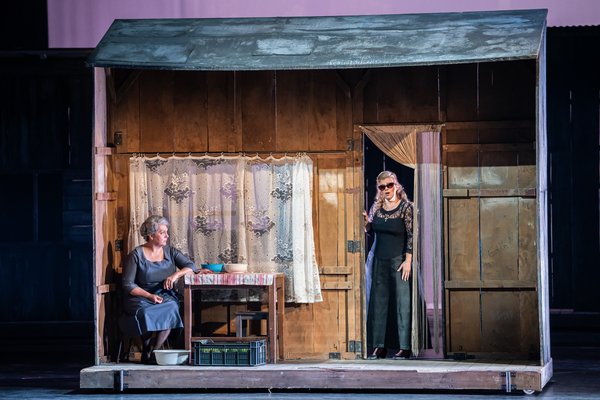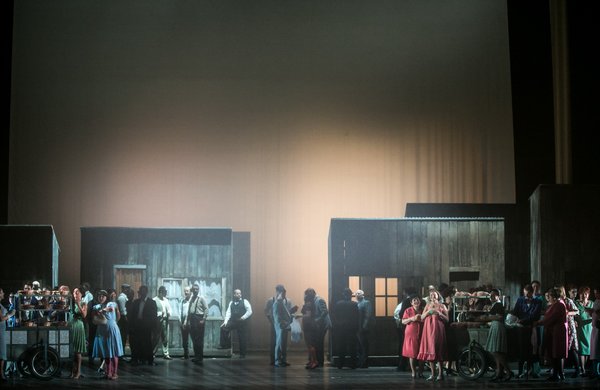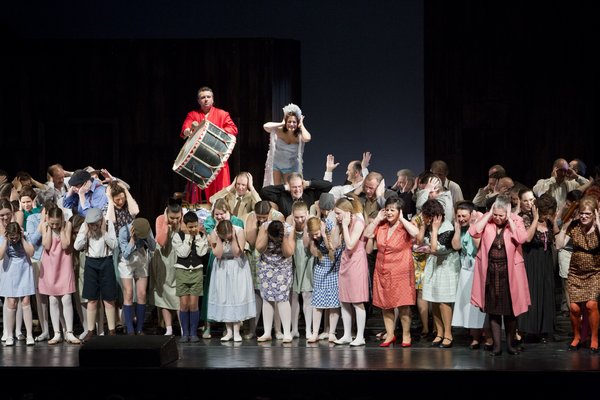
CAVALLERIA RUSTICANA / PAGLIACCI
4 April 2024, 6 p.m.
In Brief
Operas in Italian, with Hungarian, English, and Italian subtitles
“Easter Showdown Motivated By Jealousy!” “Clown Commits Murder On Stage!” These are two headlines that might have graced Edoardo Sonzogno’s front pages, and it is the Milanese newspaper publisher and his annual opera-writing competition we have to thank for Italy’s two most popular one-act works. The two pieces can be considered twin operas as they have much in common, and the works are probably the greatest examples of the verismo movement of naturalistic operas depicting the problems of flesh-and-blood characters.
The operas are staged by Georges Delnon, the Artistic Director of the Hamburg Opera.
Details
- Location
- Hungarian State Opera
- Date
- April 4, 2024
- Start time
- 6 p.m.
- End time
- 10 p.m.
Synopsis
Cavalleria rusticana
Easter Sunday in a Sicilian village.
Mother Lucia’s son Turiddu is singing to his beloved Lola. Although she is already married, he would not hesitate to die for her and would not find happiness even in heaven without her...
We are in the Village square with its church and Mother Lucia’s wine shop. Santuzza is looking for Turiddu. Lucia says her son has left for Francofonte to bring wine, but Santuzza knows he was seen in the village the previous night. Lucia’s suspicion is raised as her son did not return home... Mother Lucia invites the girl into her house so they can talk in peace, but Santuzza does not dare enter her home: “Into your house I cannot enter! I am condemned!”
Lola’s husband, Alfio the carter, arrives at the square in good spirits. He is escorted by the people of the village. “Merry is the carter’s life. He can travel all around. Happy is his calling, Richest treasures haulin,” people sing. Alfio is content with his life: he loves his work and beautiful wife.
Alfio asks for some wine, but Lucia apologises: she has run out but already sent her son to bring some more. “I saw him but this morning; and very near my dwelling!”he says. Lucia looks at him with amazement, but Santuzza tells her to be silent. The chorus sings Regina Coeli. Alfio sends the women to church and then leaves. The people of the village go to church – except Santuzza and Mother Lucia.
Mother Lucia does not understand why Santuzza told her to be silent before Alfio. The girl reminds her of Turiddu and Lola’s previous relationship, and reveals that Lola has not accepted that Turiddu now belongs to someone else: the two old lovers are still lovers, and she has been left in shame... She begs to Lucia to pray for her; she will talk to Turiddu once again – and for the last time. Mother Lucia returns to the church with a troubled mind.
Turiddu arrives. Santuzza tries to talk to him, but he refuses to respond. Santuzza starts to question to him: “Where have you been?” “Why do you ask me? At Francofonte,” he replies. Santuzza does not believe him: she saw him on another street and Alfio himself saw him at his house the previous night... “Thus you return the love I gave you? You wish him to kill me?” Turiddu asks. “You love her! curses on her!” Santuzza cries desperately. Turiddu warns the girl that he will never be a slave to her vain jealousy. “Beat me! insult me! I love and pardon; But all too heavy is my deep anguish!” the desperate Santuzza says.
“There are a thousand beautiful angels sitting in heaven, but none is fairer than he.” Lola’s song can be heard as she is approaching. They meet. Lola asks with a touch of sarcasm why the two of them are not listening to the mass inside. The two women begin to argue. Turiddu wants to leave Santuzza, but eventually Lola enters the church alone. Santuzza tries to reconcile with him, but he pushes her away: “Never will I relent.” Turiddu rushes into the church after Lola. Santuzza, overwhelmed by anguish, cries in wrath: “On thee come Evil Easter, thou false swearer!”
Alfio arrives again and Santuzza tells him everything in her deep sorrow: “Turiddu betrayed me, despoiled me of honor; And your bad wife has taken him from me.”
Santuzza swears to the carter that she has told him the bitter truth, but regrets doing so immediately: “‘Twas wicked in me to have spoken thus!” “They are infamous, unfit for living! And blood I’ll have before the close of day!” Alfio replies.
Intermezzo
The mass is over: the people come out of the church, men and women go home to their spouses with peace in their hearts. Turiddu approaches Lola as she leaves: does she really want to leave without saying goodbye? Lola explains to him that she must go home, and she has not seen her husband since he returned. Turiddu tries to convince her not to rush and have some wine instead. The glasses are filled, and Turiddu raises his glass to Lola: “To love!” “To your most happy fortune!” - Lola replies.
People drink merrily.
Alfio arrives at the square. Turiddu offers him a glass of wine immediately. “Thanks, sir! … In me it would be poison, my heart’s blood chilling!” the carter rejects the offer provocatively. Turiddu smashes the glass on the ground. Everybody knows what it means... The frightened women take Lola away from the square. The two men embrace and Turiddu bites the carter’s ear as a sign of challenging him to duel.
“Master Alfio, I know that the fault is my own; to you I swear, in the name of heaven, that like a dog I should be slaughtered.” Alfio accepts the challenge – he will be waiting for his adversary in the orchard.
Turiddu says goodbye to Mother Lucia: he asks for his mother’s blessing just as he did when he joined the army. He also makes her promise, should he not return, to take care of Santuzza as if she were her mother. Mother Lucia does not understand what her son means. Turiddu blames the wine for his strange words... “Pray you to heaven for me,” he asks her and rushes away. Lucia cries after him with terrible apprehension. Santuzza appears and a crowd covers the square. A murmur is heard from the distance. “They have murdered Turiddu!”
Pagliacci
Prologue
Act 1
A crossroads near a village in Calabria near Monalto. A tent and other equipment of a travelling commedia troupe around it. A scorching August afternoon.
A crowd of villagers is approaching: they welcome Pagliaccio, officially called Canio who is coming back for the Feast of Assumption together with his travelling troupe. “The Prince of Clowns” announces his show will be performed at 11 tonight.
Tonio, the fool of the troupe rushes to the cart to help Canio’s wife Nedda to get off, but Canio pushes him aside violently. The crowd has a good laugh about the gallant’s fiasco. The locals invite Canio for a drink. Peppe joins them, but Tonio does not. “Watch out, Pagliaccio, he wants to be alone to woo your Nedda,” a villager teases him. Canio’s reply is ironic and blood-curdling at the same time: “I say, the stage is one thing and life itself another; and if up there Pagliaccio surprises his wife with a lover in her chamber, why, he delivers a comic lecture and thereupon calms down and submits to a thrashing – and the public applauds to see such sport! But if I surprised Nedda in real life – as sure as I am speaking to you – the story would have a different ending. It’s better not to play such games, believe me.”
Pipes sound from the distance and churchbells sound vespers. The crowd leaves together with Canio and Peppe. Nedda is left alone. She contemplates Canio’s behaviour: did he read her most secret thoughts? Then she recalls a song her mother used to sing when she was a child: it was about birds that fly towards the land of their dreams they seek in vain... While she is singing, Tonio sneaks out of the tent to listen to Nedda in secret. Tonio tells Nedda he loves her, but she just laughs at the confession of love. He approaches her more and more ardously as he cannot control his desire. Eventually, the woman seizes a whip and lashes the fool across the face. Tonio swears by the Holy Virgin that Nedda will pay for this.
Tonio leaves, followed soon by the arrival of Silvio, Nedda’s secret lover. Nedda warns him that Tonio is around, but Silvio is not afraid of him. “The half-wit is to be feared!” Nedda insists. Silvio begins to beg to her to elope with him. Nedda – although attracted by the promise of a happy future – rejects the crazy plan.
“You love me no longer!” the desperate Silvio says. Nedda assures her that the love she feels to him will never die. Tonio overhears this profession of love, and, thirsty for revenge, rushes to Canio. The two lovers kiss passionately. Nedda surrenders and agrees to flee. Silvio is about to leave when Canio arrives, led by Tonio. The husband just catches his wife’s words: “Until tonight, and I’ll be yours forever.” Silvio runs away, followed by Canio. Nedda casts a hateful look at Tonio, who is happy to be taking revenge.
Canio returns, having lost the lover’s trail. He grabs his dagger and is ready to cut the woman’s throat, but first he needs to know the lover’s name. Nedda refuses to tell him. Eventually, Peppe returns and unarms the raving husband. He warns him that the villagers are coming and they have to get ready for the show. The shattered Canio is left alone.
“Put on the costume, the powder and the paint: the people pay and want to laugh. And if Harlequin steals your Columbine, laugh, Pagliaccio, and all will applaud you!”
Intermezzo
Act 2
The show is about to begin. The audience throng; Silvio arrives too. Peppe tries to calm down the audience, and Nedda, dressed up as Colombina, walks to the audience to collect the admission fees. When she gets to Silvio, they exchange some words hastily: Nedda whispers to the man that Canio did not see him, and Silvio reminds her of their plan. The show begins...
Colombina’s husband Pagliaccio is expected home late at night. The woman waits for her servant Taddeo impatiently. But instead of him, Arclecchino’s voice can be heard: he is Colombina’s lover. Taddeo arrives at last: he has brought a chicken from the shop. Taddeo wants to confess his love to this beautiful and pure woman, but she is preoccupied with the price of the chicken and the window. Suddenly, Arlecchino jumps in through the window, takes Taddeo by the ear and throws him out. Taddeo backs out of the room, suddenly realising that the two are in love with each other. He leaves – and the audience applauds. They sit down and begin to have dinner. Arlecchino produces a small phial: “Take this drug and give it to Pagliaccio before he goes to sleep, and then we’ll run off together,” he says. “Yes, let me have it,” Colombina replies. Taddeo enters the room again: he announces loudly that Pagliaccio is coming and he knows everything! Taddeo hides, and Arlecchino jumps out of the window. Pagliaccio appears on the side of the stage. Colombina shouts through the window: “Till tonight, and I shall be yours forever!” Canio is shocked to hear exactly the same words again, but he continues to perform. Pagliaccio notices that the table has been set for two. Colombina lies that she had dinner with Taddeo, who has hidden in fear. “She is pure! Her pious lips abhor all falsehood!” Taddeo says from behind the door. The audience laughs – and Canio loses his temper. He demands that Nedda tell him the name of her lover, but Nedda does not fall out of character. Canio bursts out bitterly. Silvio can hardly contain himself, the audience is fascinated by Pagliaccio’s moving performance. Canio demands the name of her lover. Nedda tries to finish the play, but Canio’s look makes Colombina’s laugh freeze in her. Peppe wants to intervene, but Tonio does not let him do so. Canio stabs Nedda on the stage several times, still demanding her lover’s name. Nedda cries for help from Silvio, who rushes on the stage. Canio stabs him too. “La commedia è finita.”
Gallery
Reviews
“During the commedia dell’arte scene, the audience – together with the viewers on stage – could gaze into a magnified window, held wide in the form of a kind of projection screen, in which life and theatre blend together. It was both restrained and effective.”
(Rolf Fath, Opera Lounge)
(Rolf Fath, Opera Lounge)
“We came from Munich to see the aforementioned operas, and the directing, the singing and the conducting all filled us with amazement. (…) Unfortunately, Munich is not so close to Budapest, for otherwise we would spend every night in your opera house."
(Dr. Eva and Siegmar Riedel, Munich)
(Dr. Eva and Siegmar Riedel, Munich)


